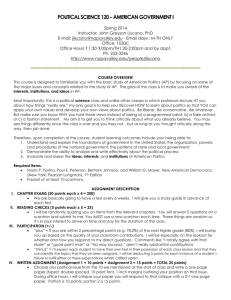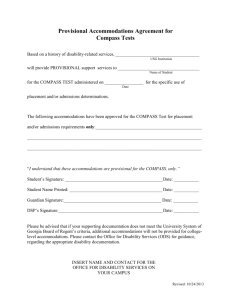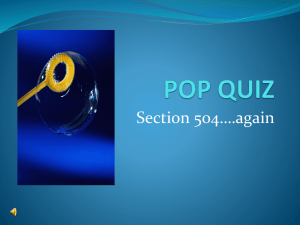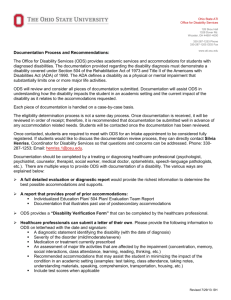Psychological Disorders - Savannah State University
advertisement
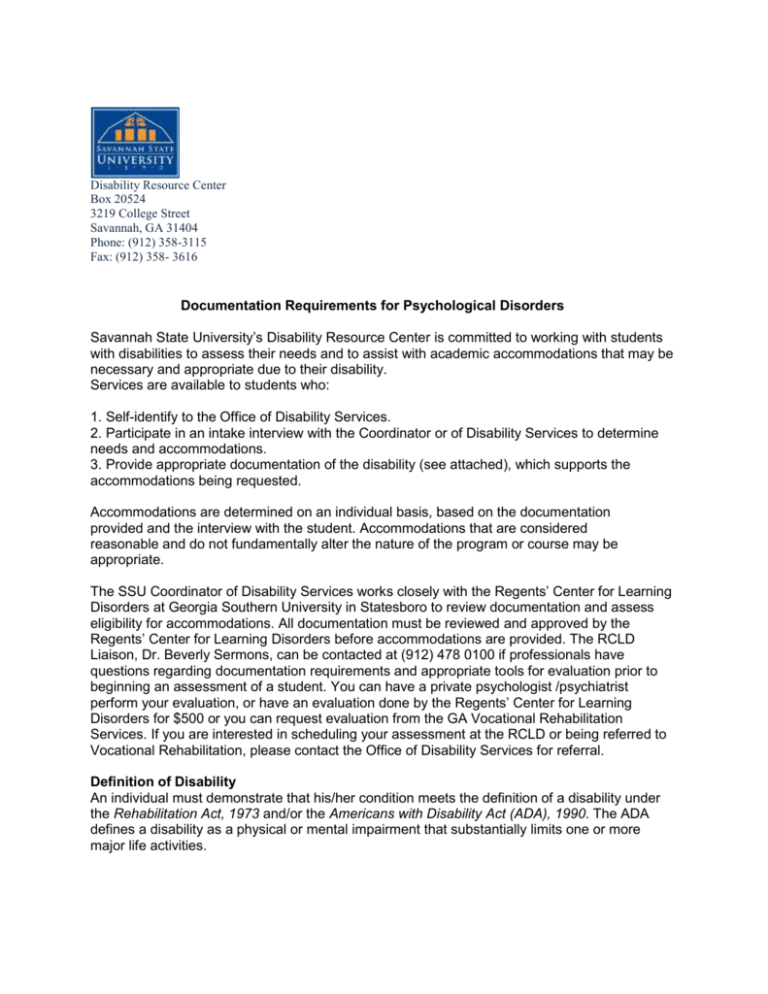
Disability Resource Center Box 20524 3219 College Street Savannah, GA 31404 Phone: (912) 358-3115 Fax: (912) 358- 3616 Documentation Requirements for Psychological Disorders Savannah State University’s Disability Resource Center is committed to working with students with disabilities to assess their needs and to assist with academic accommodations that may be necessary and appropriate due to their disability. Services are available to students who: 1. Self-identify to the Office of Disability Services. 2. Participate in an intake interview with the Coordinator or of Disability Services to determine needs and accommodations. 3. Provide appropriate documentation of the disability (see attached), which supports the accommodations being requested. Accommodations are determined on an individual basis, based on the documentation provided and the interview with the student. Accommodations that are considered reasonable and do not fundamentally alter the nature of the program or course may be appropriate. The SSU Coordinator of Disability Services works closely with the Regents’ Center for Learning Disorders at Georgia Southern University in Statesboro to review documentation and assess eligibility for accommodations. All documentation must be reviewed and approved by the Regents’ Center for Learning Disorders before accommodations are provided. The RCLD Liaison, Dr. Beverly Sermons, can be contacted at (912) 478 0100 if professionals have questions regarding documentation requirements and appropriate tools for evaluation prior to beginning an assessment of a student. You can have a private psychologist /psychiatrist perform your evaluation, or have an evaluation done by the Regents’ Center for Learning Disorders for $500 or you can request evaluation from the GA Vocational Rehabilitation Services. If you are interested in scheduling your assessment at the RCLD or being referred to Vocational Rehabilitation, please contact the Office of Disability Services for referral. Definition of Disability An individual must demonstrate that his/her condition meets the definition of a disability under the Rehabilitation Act, 1973 and/or the Americans with Disability Act (ADA), 1990. The ADA defines a disability as a physical or mental impairment that substantially limits one or more major life activities. Substantially limits under ADA refer to significant restrictions as to the condition manner, or duration under which an individual can perform a particular major life activity as compared to most people. Whether a condition is substantially limiting to support an accommodation request is a decision made by qualified professional(s) based upon multiple sources of information. A clinical diagnosis is not synonymous with a disability. The specific symptoms that are present should be stated in the documentation. Evidence that these symptoms are associated with substantial impairment in a major life activity is required for provision of accommodations. A detailed description of current substantial limitation in the academic environment is essential to identify appropriate academic accommodations, auxiliary aids, and services. Specific requests for accommodations need to be linked to the student's current functional limitations, and the rationale for each recommendation clearly stated. General Documentation Guidelines Secondary education eligibility reports, Individualized Educational Plans, Summary of Progress reports, or previous provision of special education services may not be sufficient documentation for college-level accommodations. Documentation should provide a diagnostic statement identifying the disability, describe the diagnostic criteria and methodology used to diagnose the condition, and detail the progression of the condition if its impact on the student's functioning is expected to change over time. Documentation should provide an adequate representation of the student's current functional abilities. In most situations, documentation should be within three years of the student's application for services. Professional judgment, however, must be used in accepting older documentation of conditions that are permanent or non-varying, or in requiring more recent documentation for conditions for which the functional impact may change over time. Documentation must include the names, signatures, titles, and license numbers of the appropriate evaluators, as well as the dates of testing and contact information. Evaluators must be licensed professionals whose training and licensure status is consistent with expertise in the disability for which they provide documentation. Psychological Disorders Documentation Some individuals experience significant disruptions in mood, thinking, and behavioral regulation that are secondary to a psychological disorder. Many different psychological disorders can interfere with cognitive, emotional, and social functioning and may negatively impact a student's ability to function in an academic environment. The symptoms and associated impairment may be either chronic or episodic. Test anxiety by itself is not considered a psychological disorder. Complete descriptions and diagnostic criteria for psychological disorders are available in the current version of the American Psychiatric Association’s Diagnostic and Statistical Manual, 5th edition.(DSM). Information needed includes: *DSM diagnosis and corresponding DSM code. Description of the history, current symptoms, and severity of the disorder. Description of the expected progression or stability of the disorder. Description of the current functional limitations impacting academic performance resulting from the disorder. Please note that the Disability Resource Center cannot override professors’ or academic departments’ policies regarding attendance and make up work. For additional information, contact Amelia Castilian-Moore, Coordinator of Disability Services at (912) 358 3115 or by fax at 912 358 3616 or email her at moorea@savannahstate.edu Updated 06/14

